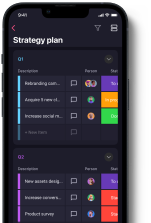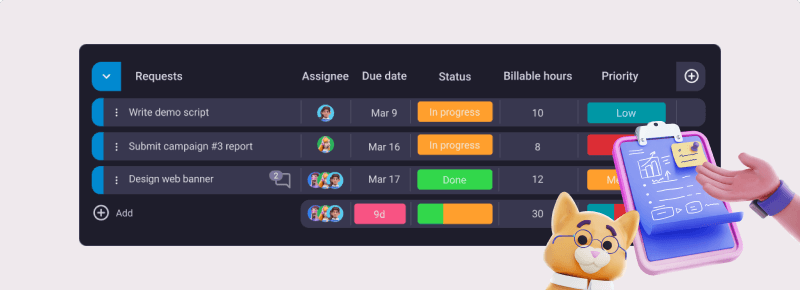Any marketing venture is complicated.
Say you’re running a small business that sells honey, and you want to promote it on social media. You know you need to post frequently, but you have no schedule. You’re gaining followers slowly, but no one has ordered anything yet.
This is where project management needs to be added to the mix. Marketing project management makes sure that your goals are on point, your schedule is clear, and the small honey shop is out of stock in no time.
So, let’s dive into what marketing project management is, how it works, and why you should pay close attention to it.

- Marketing project management introduces project management methods to improve the organization of a marketing campaign.
- The job outlook of marketing project managers is expected to grow by 7% to 2032.
- The most important resources for a marketing project are people and their skills, budget, and time.
- Marketing project management consists of 6 phases: doing research, identifying goals and objectives, developing a marketing strategy, launching a campaign, examining results, and reevaluating.
- Marketing management software boosts productivity and eases the effort required for any of the 6 marketing project management phases.
Table of Contents
What is marketing project management?
Marketing project management is a dynamic field that involves organizing marketing campaigns while making sure all the tasks within the campaign are completed as planned.
This process encompasses a great number of tasks ranging from gathering market research data to defining timelines, budget, and scope.
In the realm of marketing, project managers need to adapt their skills to fit the requirements of a marketing campaign. This is because marketing is a field that experiences frequent changes and requires loads of creativity — however, it can still use the touch of stability and adaptability that project management offers.
Consequently, it is not surprising that the U.S. Bureau of Labor Statistics states the job outlook for marketing managers is great and is expected to grow by 7% from 2022 to 2032.
What does a marketing project manager do?
The responsibilities of a marketing project manager are many. The expert we contacted, Laia Martin Quintana, Head of Marketing and Sales at TeamUp, summed up the numerous tasks they perform:

“Marketing project managers like me are responsible for planning, executing, and overseeing marketing projects from inception to completion. This involves setting project goals, defining tasks, allocating resources, and setting timelines. I also coordinate with various teams, manage risks, and ensure that all projects align with our company’s strategic objectives.”
Still, these are just some of the responsibilities that marketing project managers have. So, in the following section, we will delve deeper into the most important responsibilities of these professionals.
Responsibility #1: Oversee the project
A marketing project manager needs to organize the project from its conception to its end. Therefore, a PM must constantly oversee the project as it’s being executed.
As Laia tells us, the very start of her day is dedicated to checking how the projects are progressing:

“Upon entering the office, my day begins with a review of our project management dashboard. This gives me an overview of ongoing campaigns, their current status, and any urgent tasks that need attention. I then meet with the team to discuss progress, brainstorm ideas, and address any challenges.”
And, at the end of her work day, she applies any necessary changes:

“Towards the end of the day, I update our project timelines and prepare reports on campaign performance. These insights are crucial in measuring our success and planning future initiatives.”
A project may go through significant changes during its course. This is why you need to remain vigilant so that you can steer it in the right direction whenever changes occur.
Responsibility #2: Define goals and milestones
A marketing PM needs to ensure that the goal of a marketing campaign is clear. If the goal is say, to build brand awareness, they need to define specific outcomes of the campaign that will indicate its success.
To measure success, select and track appropriate key performance indicators (KPIs). Examples of KPIs suited to marketing project management include:
- Customer satisfaction questionnaire answers,
- New customer growth,
- Sales revenue,
- Social media follower counts,
- YouTube or newsletter subscribers, etc.
If you want to track progress toward your goal, you can use project milestones. A milestone is a key project event that a project manager needs to define and keep track of.
Milestones are useful for tracking how far away a certain goal is — for example, completing a design can be a milestone in a billboard-centered marketing campaign.
Responsibility #3: Determine the scope
One of the first things a project manager needs to determine is the project scope. Scope includes all work that needs to be done in order to complete the project — both in terms of quantity and quality.
Scope is defined through a document called the scope statement of work — which includes project deliverables, goals, limitations, etc.
It’s important to note that scope is susceptible to change during the project — this is where the notorious scope creep comes in.
Scope creep is an uncontrolled expansion of the project scope. It can often lead to missed deadlines, lack of resources, reduced quality, etc. It’s a project manager’s job to keep the scope in check — as goals or the project size change, appropriate adjustments must be made.
The scope will conform to the other 2 project constraints — budget and timeline. These limits determine how you’re going to plan the rest of your project — how you’ll distribute resources, create the project plan, communicate with stakeholders, etc.
💡PLAKY PRO TIP
If you want to learn more about scope creep and how to prevent it, check out this guide:
Responsibility#4: Distribute resources
The project resources that are most commonly required in marketing projects include:
- People and their expertise,
- Budget, and
- Time.
It’s the project manager’s job to define, acquire, and distribute resources accordingly during the project’s conception and execution.
Marketing campaigns typically don’t require a lot of material resources, especially digital ones. Instead, they require adequate marketing skills from team members — such as data analysis, communication, creativity, SEO skills, etc.
Marketing campaigns also usually take up a lot of time to prepare and execute. For example, movie trailers sometimes drop a full year ahead of the theatrical releases, with teaser images and supposed leaks potentially dropping even earlier than that.
Since it’s a PM’s job to create the project timeline, they must understand how much time each task will require.
💡PLAKY PRO TIP
If you want to learn more about distributing resources in your project, check out this useful guide:
Responsibility #5: Refine Marketing Strategies
As Laia tells us, a large portion of her day is dedicated to strategizing:

“A significant part of my day involves analyzing market trends and customer feedback. This data guides us in refining our marketing strategies, ensuring our message resonates with the target audience.”
Market analysis, as we mentioned earlier, is one of the key skills needed for any marketing campaign. So, you will also need to utilize that skill to develop the optimal marketing strategy for your project to move forward.
💡 Plaky Pro Tip
Check out the free marketing strategy template we offer in the link below. You’ll also find other useful templates for various kinds of strategic planning:
Why is project management important for marketing?
Marketing and project management interact when there is a need to incorporate the key responsibilities of a project manager into a particular marketing campaign and its phases.
Simply stated, you need project management skills to organize a marketing campaign and keep track of industry trends and consumer demands. The way you run a campaign affects all the people who take part in it.
If you take a look at job ads for marketing project managers, you can usually see that an ideal candidate is a person with strong leadership and strategic planning skills. They need strong communication and analytical skills and a profound understanding of the latest marketing trends and methodologies.
Maintaining cross-team collaboration is one of the key responsibilities of marketing project managers since they have to coordinate their efforts with:
- Marketing directors and other stakeholders,
- SEO professionals,
- Writers and graphic designers,
- Event planners,
- Clients,
- Suppliers,
- Vendors, and others.
6 Phases of the marketing project management process
While marketing project management follows the standard project management phases, it also adds a couple of additional ones, such as the adoption of marketing strategies and market research.
Phase #1: Conduct research
Research is an essential prerequisite for running any marketing project. It involves collecting data from consumers or other relevant groups to analyze all the relevant factors, including:
- The market,
- Industry trends,
- Possible target group(s),
- Customer preferences, and more.
There are 6 key steps to marketing research:
- Defining the problem/the aim of research — i.e. increasing sales or establishing opportunities for a new business venture.
- Preparing a research plan — in this step, you determine how your research will be performed. You can decide on primary research (data is collected for the first time) or secondary research (pre-existing data is taken from other sources).
- Choosing a research methodology — i.e. choosing ways to collect data such as email surveys, focus groups, social media tracking, purchased data, etc.
- Preparing and analyzing the acquired data — i.e. organizing and interpreting data using spreadsheets or other, more elaborate tools.
- Presenting results — sharing key research findings with the people involved in decision-making.
- Integrating results into the next phase — using gathered data to inform next-phase decisions.
Different companies have their own approaches to marketing research. If your research results match the goals you wanted to achieve, you have a better chance of successfully starting the next phase.
To best keep track of these tasks and the relevant documentation, you can use project management software like Plaky.
In Plaky, you can list all your project activities, assign people, add due dates, and much more.
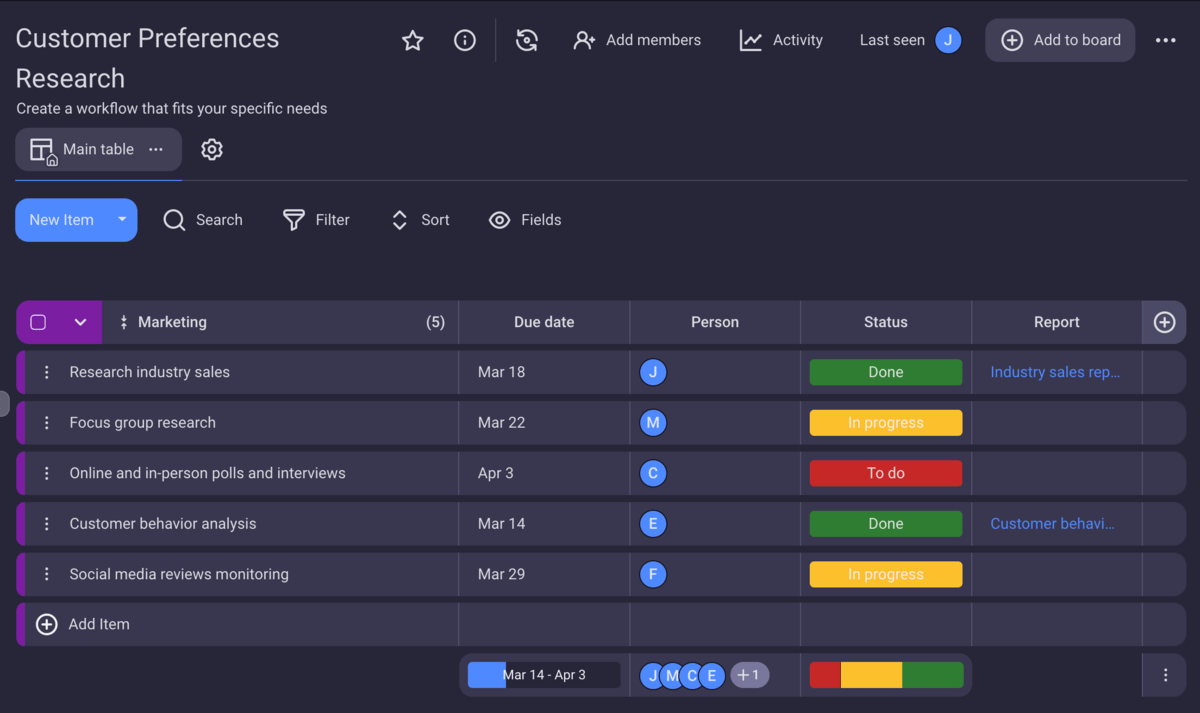
Phase #2: Identify goals and objectives
In this phase, you can define the concrete goals of your marketing project based on your research.
For example, you might have set out to explore why your product’s sales have plummeted lately. Through research, you’ve established that the reason lies in a competitor’s successful ad campaign, which has completely overshadowed your product’s visibility.
Thus, your new goal is to raise awareness of your product through a strong marketing campaign.
💡 PLAKY PRO TIP
To enhance chances for your campaign success, you can also consider Objectives and Key Results (OKRs). If your Objectives cannot be directly measured, you need Key Results to guide you. Read more about this in the following post and check out our free OKR templates:
This phase aims to lay the foundation for the process by determining:
- Project tasks,
- Available project resources,
- Timelines,
- Budget, and
- Your project’s key performance indicators (KPIs).
While defining your project goals, make sure you analyze any potential challenges and prepare risk management solutions.
Last, but not least, while establishing a project plan, keep in mind that all the major stakeholders and marketing team members should approve the project documentation and agreed terms at the beginning of the process.
To keep track of these tasks and reports more easily, you can use a Plaky and keep all project information in one place.
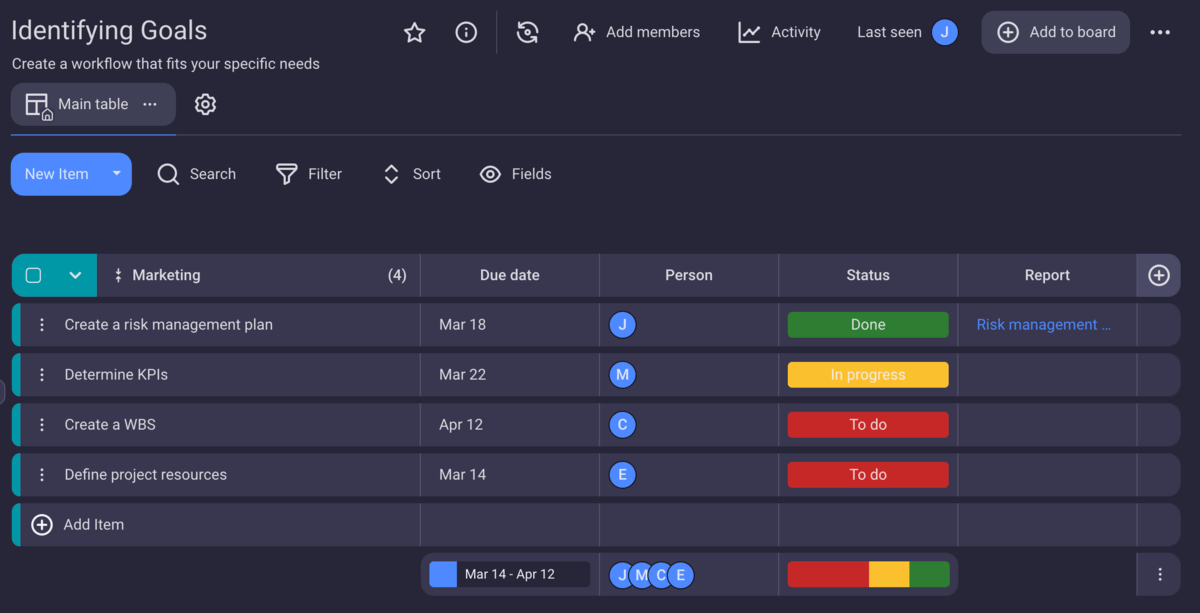
This way, everyone will know what to expect, what their role is, and the time they have to complete their tasks.
Now, you are all set to develop a marketing strategy.
Phase #3: Develop a marketing strategy
Your marketing strategy depends on your pre-determined goals and objectives.
This is the phase in which a marketing project manager:
- Identifies a target audience and market growth opportunities,
- Recognizes the needs of customers based on market trends, customers’ social and cultural background, and their behavior,
- Takes into account the 4 Ps of marketing — product, price, place, and promotion, and
- Chooses channels to promote their company’s products and services, such as social media, digital PR, content marketing, etc.
💡PLAKY PRO TIP
If you want to learn about the steps required to create a strategic marketing plan, read the following post:
These tasks can also be clearly divided in Plaky, where you can track their progress via the Status field.
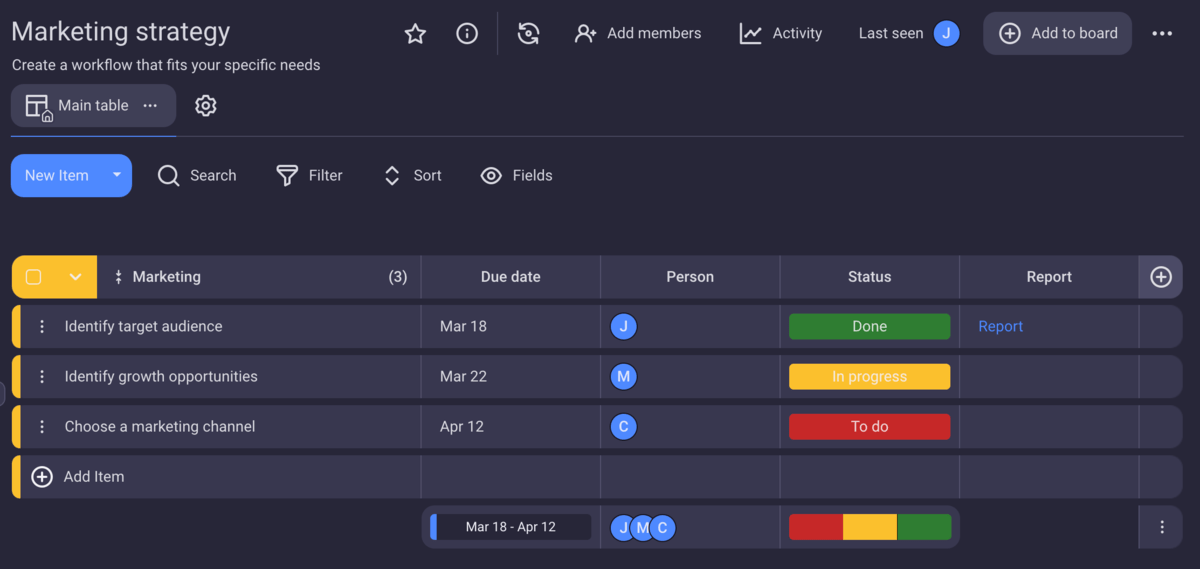
When you map up your strategic plan, you can finally launch your campaign.
Phase #4: Launch a marketing campaign
The campaign launch is an exciting and core phase of the marketing project management process. The team in charge can start the implementation of the plan and thus present a product or a service to the target audience.
The responsibilities of a marketing project manager during the campaign include:
- Overseeing the process,
- Having regular meetings with supporting teams to check if everything runs as planned, and,
- Keeping in touch with stakeholders who should be informed of the campaign’s progress.
When the campaign is finished, the next step is to examine the results and see if it was successful.
Let’s say your marketing campaign is for a product — honey jars. You decide to go for a social media marketing campaign, and Plaky has a social media calendar template you can use. For a better overview of your tasks, you can also use the Kanban view.
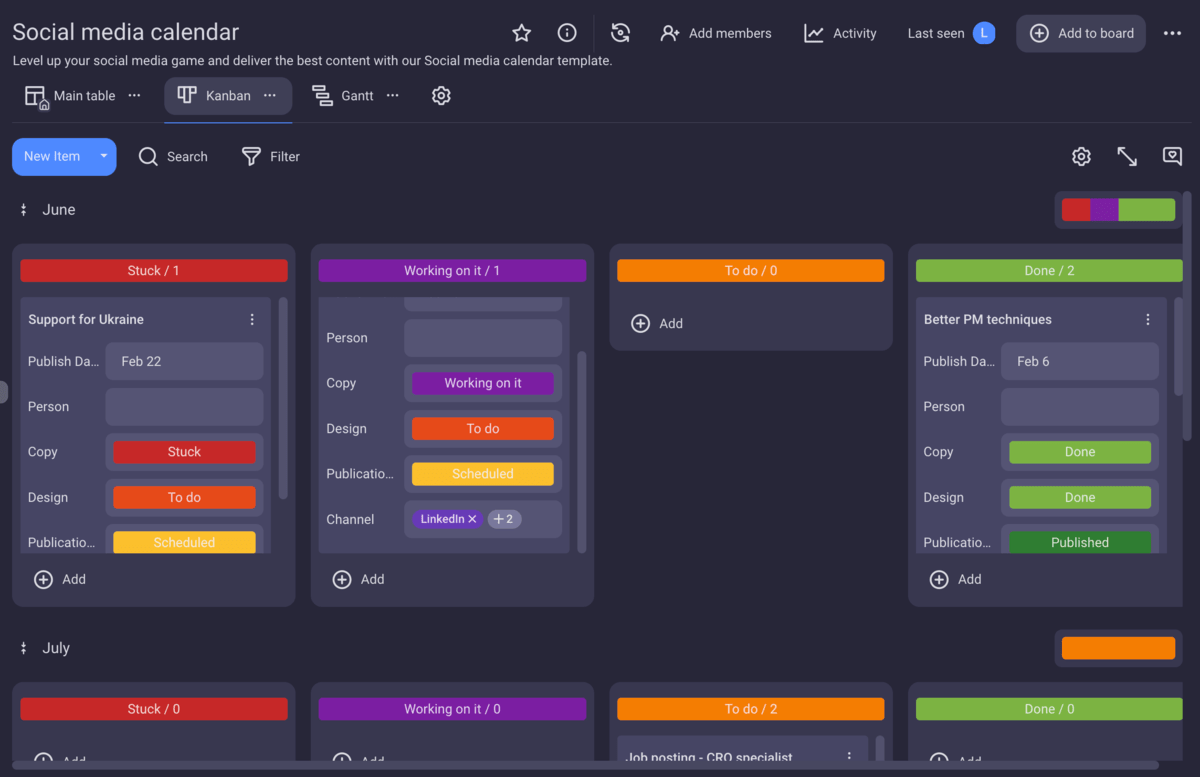
💡PLAKY PRO TIP
How do you manage a marketing campaign? Learn the basics and get expert tips in the guide below:
Phase #5: Examine marketing campaign results
This phase is all about checking if the campaign bore any fruit. The team and stakeholders examine if the results of the campaign have met expectations and compare them against the previously established KPIs.
If the results meet the metrics, you can consider your campaign a success.
Again, to keep track of every report, you can use Plaky.
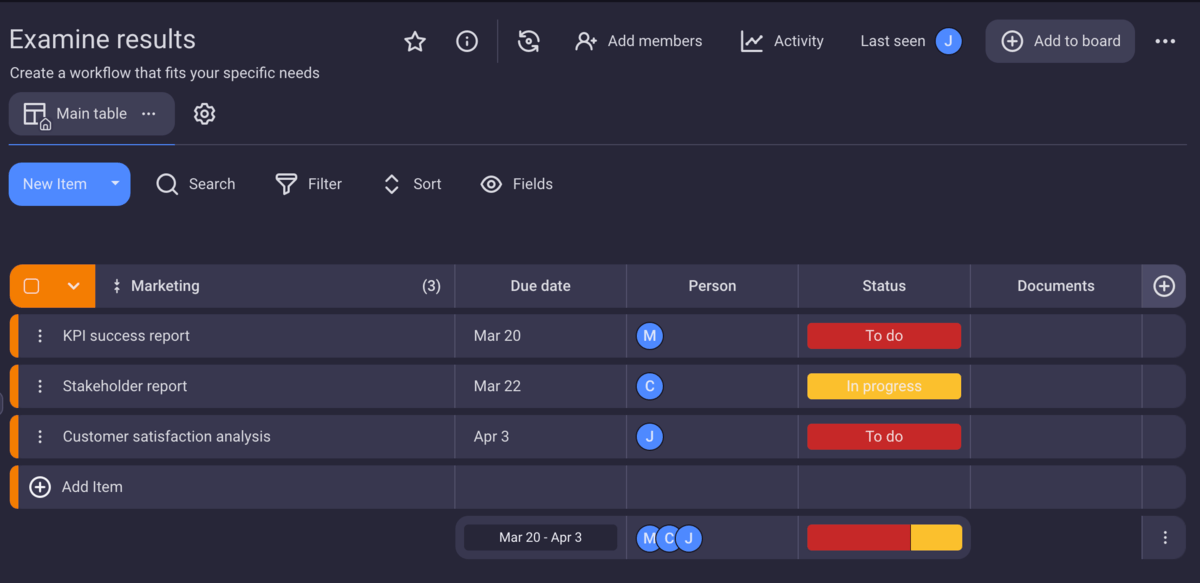
By examining the campaign data, you can see which channel reached the largest audience, as well as which audience demographic had the best response to the campaign.
After you examine the results, you can flow into the review phase.
Phase #6: Reevaluate and revise your marketing strategy
In the revision phase, the people in charge of the campaign carefully analyze the results to see what they can improve on.
The aim is to analyze the campaign’s strengths and weaknesses. This way, you can see what you can reuse in your next marketing effort and what improvements and/or adjustments you can make to reach wider audiences.
As you can see, the marketing management process involves many tasks and subtasks. Therefore, managers need to have a suitable and reliable project management tool at their disposal.
How marketing project managers can use Plaky
Marketing project managers would benefit from using quality software and having their goals, marketing strategy, tasks, project budget, and other project elements in one centralized system.
All of this, and more, can be accomplished using marketing project management software such as Plaky — a platform that allows for an unlimited number of users, teams, and files.
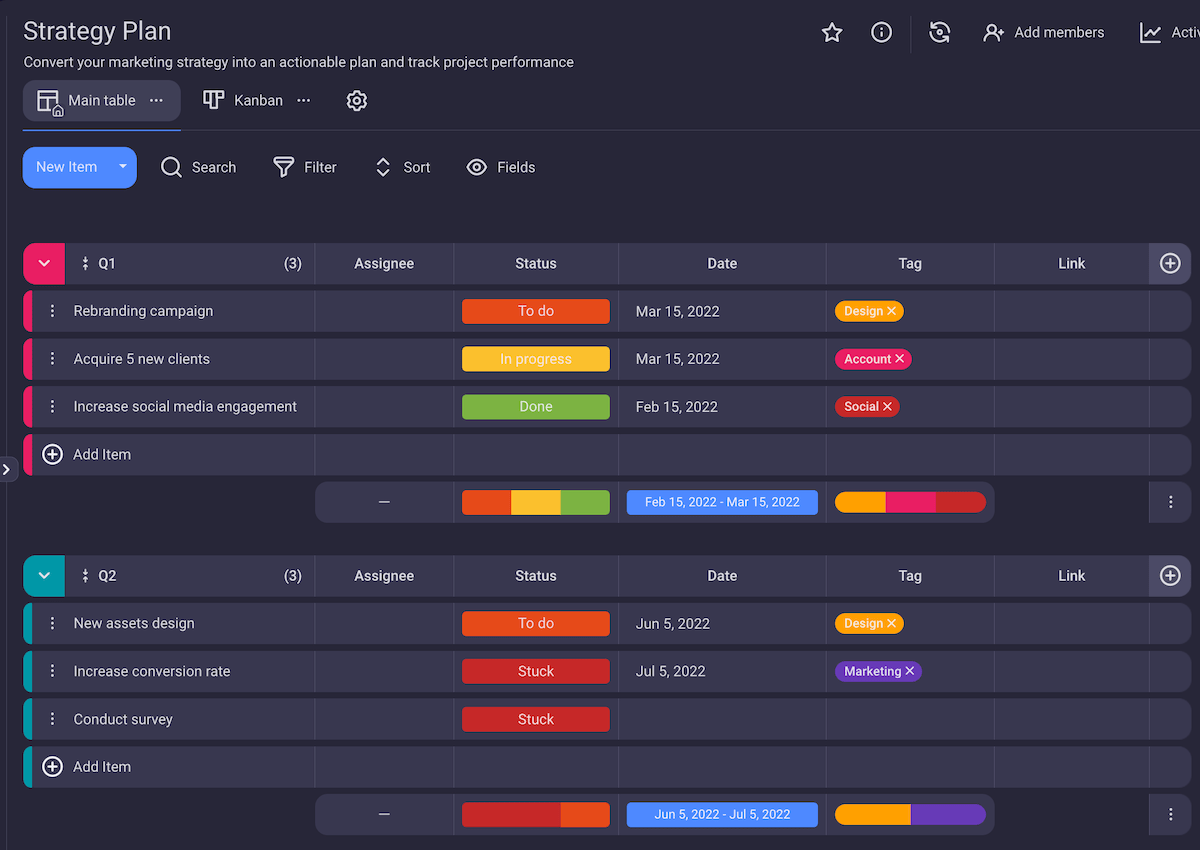
Plaky is a great solution when you want to:
- Organize all your marketing processes in one place, and
- Use ready-made project management templates to create workflows for every department.
As regards organization, Plaky has a lot to offer, and you can use it to:
- Set up a marketing strategy — define your plan and steps needed to reach your goal, set deadlines, classify resources, keep track of the budget and manpower, and track progress.
- Plan your marketing initiatives — Plaky can provide an overview of product launches, event planning, and content publications.
- Track the design process — have complete control over files, correspondence, solutions, feedback, and updates.
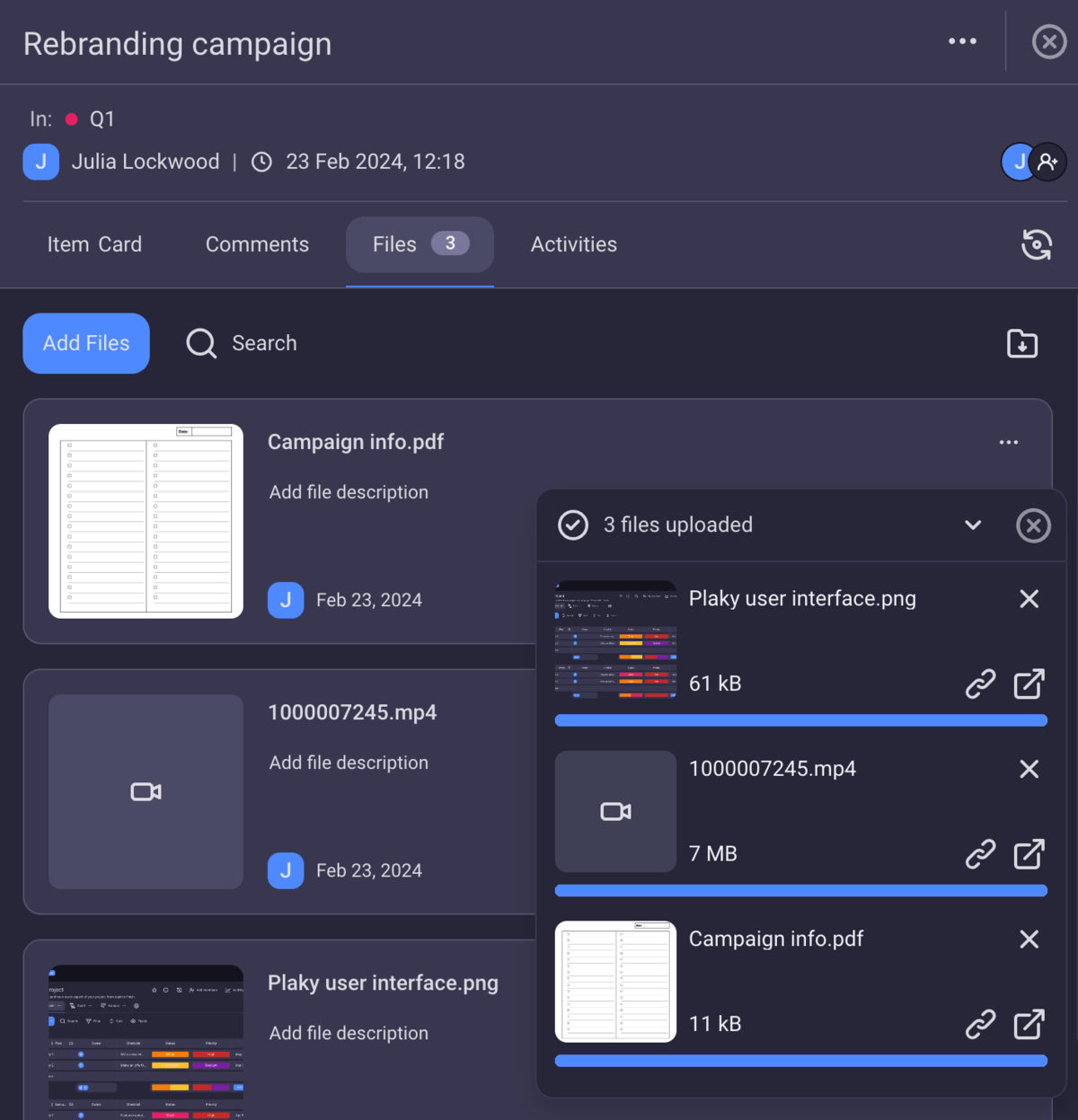
Plaky also offers many customizable templates you can use for free, such as:
- Marketing strategy template — share tasks, break them into sub-tasks, pass on information across departments, and keep an eye on every single part of project performance.
- Content calendar template — secure an uninterrupted flow of blog posts, videos, and other relevant publications through a thorough content plan.
- Creative request form template — launch projects faster and ensure cross-team collaboration.
- Event planning template — use this template to organize and stay on top of any marketing event.
- Social media calendar template — make sure you post the right content at the right time.

💡 PLAKY PRO TIP
Ready-made templates are a great way to organize your project. But, you can also modify them the way it suits you best. Check out the following pages to learn more:
✉️ Are you the person whose job is project-oriented? Have you ever worked in marketing project management? Or, are you willing to try? Have you ever used Plaky or any other task management software? We would be more than happy to hear from you. You can always email us at blogfeedback@plaky.com and share your experience which we may include in some of our future posts. If you know anyone who would find this text interesting, please share it with them.



